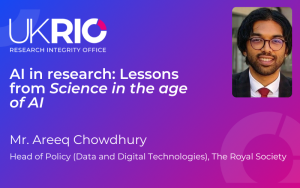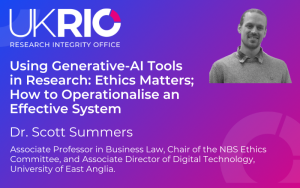AI in research: supporting research integrity through governance and ethics
AI in research: supporting research integrity through governance and ethics
Wednesday 09 October 2024 10-11AM BST
In this webinar, speakers addressed the rise in artificial intelligence (AI) tools available to researchers and their implications for research integrity. Specifically, they focused on how research governance and ethics can be used to mitigate the risks — and harness the opportunities — presented by AI.
Speakers:

Mr Areeq Chowdhury
AI in research: lessons from ‘Science in the age of AI’
Mr. Chowdhury discussed learnings on the implications of AI for scientific research from the Royal Society’s recently published report, Science in the age of AI.
You can view a recording of Mr Chowdhury’s presentation here.
This presentation gave attendees:
- An overview of how AI is impacting the nature and method of scientific research.
- Specific considerations for how AI is affecting science.
- Recommendations of actions for improving the use of AI for science.
You can access a PDF version of this presentation here.
About Mr. Chowdhury:
Areeq Chowdhury is Head of Policy (Data and Digital Technologies) at the Royal Society. His team focuses on how artificial intelligence and other data-driven technologies can, and should, be used to benefit humanity.
Areeq is also an elected Councillor for Canning Town, in East London, and founded the influential technology policy think tank, WebRoots Democracy, which ran between 2014 and 2020. He has authored various reports on digital democracy, social media, and artificial intelligence.

Dr. Scott Summers
Using Generative-AI Tools in Research: Ethics Matters; How to Operationalise an Effective System
Dr. Summers explored ethical and legal considerations for using Generative-AI tools within research projects, examining the issue from both the perspective of researchers and research institutions.
This presentation taught attendees to:
- Be aware of some of the key ethical and legal considerations when proposing to use Generative-AI tools in research.
- Be able to identify what institutes can do to operationalise an effective procedure and process to enable the use of these tools in research projects.
- Be conscious of some of the core requirements for designing an effective Participant Information Sheet (PIS) for incorporating Generative-AI tool usage in a research project.
You can access a PDF version of this presentation here.
About Dr. Summers:
Dr. Summers is the Associate Professor in Business Law, Chair of the NBS Ethics Committee, and Associate Director of Digital Technology at the University of East Anglia. He also sits on the UK Data Archive’s Information Security Management Group (ISMG) and was formerly a Senior Research Data Services Officer at the UK Data.
Click here to learn more about Dr. Summers’ work: https://research-portal.uea.ac.uk/en/persons/scott-summers
About UKRIO’s public webinar series:
UKRIO hosts multiple free, public webinars throughout the year where experts explore emerging challenges in research integrity and share practical advice. These events are great opportunities for researchers, students, administrators, and other research stakeholders to stay informed on developing topics in research integrity and learn new skills to improve their work.
You can register for upcoming UKRIO public webinars here.
You can view content from past webinars and other public UKRIO events here.
